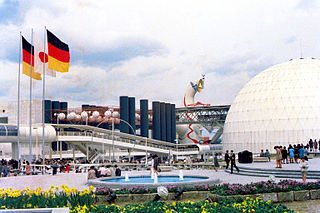
Stimmung, for six vocalists and six microphones, is a piece by Karlheinz Stockhausen, written in 1968 and commissioned by the City of Cologne for the Collegium Vocale Köln. Its average length is seventy-four minutes, and it bears the work number 24 in the composer's catalog.
Kontra-Punkte is a composition for ten instruments by Karlheinz Stockhausen which resolves contrasts among six instrumental timbres, as well as extremes of note values and dynamic levels, into a homogeneous ending texture. Stockhausen described it: "Counter-Points: a series of the most concealed and also the most conspicuous transformations and renewals—with no predictable end. The same thing is never heard twice. Yet there is a distinct feeling of never falling out of an unmistakable construction of the utmost homogeneity. An underlying force that holds things together—related proportions: a structure. Not the same Gestalten in a changing light. But rather this: various Gestalten in the same light, that permeates everything."

Momente (Moments) is a work by the German composer Karlheinz Stockhausen, written between 1962 and 1969, scored for solo soprano, four mixed choirs, and thirteen instrumentalists. A "cantata with radiophonic and theatrical overtones", it is described by the composer as "practically an opera of Mother Earth surrounded by her chicks". It was Stockhausen's first piece composed on principles of modular transposability, and his first musical form to be determined from categories of sensation or perception rather than by numerical units of musical terminology, which marks a significant change in the composer's musical approach from the abstract forms of the 1950s.
Gruppen for three orchestras (1955–57) is amongst the best-known compositions of German composer Karlheinz Stockhausen, and is Work Number 6 in the composer's catalog of works. Gruppen is "a landmark in 20th-century music ... probably the first work of the post-war generation of composers in which technique and imagination combine on the highest level to produce an undisputable masterpiece".

Kontakte ("Contacts") is an electronic music work by Karlheinz Stockhausen, realized in 1958–60 at the Westdeutscher Rundfunk (WDR) electronic-music studio in Cologne with the assistance of Gottfried Michael Koenig. The score is Nr. 12 in the composer's catalogue of works, and is dedicated to Otto Tomek.

Dienstag aus Licht is an opera by Karlheinz Stockhausen in a greeting and two acts, with a farewell, and was the fourth of seven to be completed for the opera cycle Licht: Die sieben Tage der Woche. It was begun in 1977 and completed from 1988 to 1991, to a libretto by the composer.

Spiral, for a soloist with a shortwave receiver, is a composition by Karlheinz Stockhausen, written in 1968. It is Number 27 in the catalogue of the composer's works.

Mixtur, for orchestra, 4 sine-wave generators, and 4 ring modulators, is an orchestral composition by the German composer Karlheinz Stockhausen, written in 1964, and is Nr. 16 in his catalogue of works. It exists in three versions: the original version for full orchestra, a reduced scoring made in 1967, and a re-notated version of the reduced scoring, made in 2003 and titled Mixtur 2003, Nr. 162⁄3.
Studie I is an electronic music composition by Karlheinz Stockhausen from the year 1953. It lasts 9 minutes 42 seconds and, together with his Studie II, comprises his work number ("opus") 3.

Refrain for three players is a chamber music composition by Karlheinz Stockhausen, and is number 11 in his catalog of works.
Prozession (Procession), for tamtam, viola, electronium, piano, microphones, filters, and potentiometers, is a composition by Karlheinz Stockhausen, written in 1967. It is Number 23 in the catalogue of the composer's works.

Pole (Poles), for two performers with shortwave radio receivers and a sound projectionist, is a composition by Karlheinz Stockhausen, written in 1970. It is Number 30 in the catalogue of the composer's works.
Thomas H. Wells is an American composer, pianist, organist, and arts-organization administrator.

Atmen gibt das Leben, is a choral opera with orchestra by Karlheinz Stockhausen, written in 1974 and expanded in 1976–77. It is Number 39 in the catalogue of the composer's works, and lasts about 50 minutes in performance.

Harlekin (Harlequin) is a composition for unaccompanied clarinet by Karlheinz Stockhausen, named for the commedia dell'arte character Harlequin. It was composed in 1975 and is Number 42 in his catalogue of works. A shorter, derived work called Der kleine Harlekin is Number 42½.

Expo, for three performers with shortwave radio receivers and a sound projectionist, is a composition by Karlheinz Stockhausen, written in 1969–70. It is Number 31 in the catalogue of the composer's works.

Sternklang, is "park music for five groups" composed in 1971 by Karlheinz Stockhausen, and bears the work number 34 in his catalogue of compositions. The score is dedicated to his spouse, Mary Bauermeister, and a performance of the work lasts from two-and-a-half to three hours.
Schlagtrio is a chamber-music work for piano and two timpanists composed by Karlheinz Stockhausen in 1952. It is Nr. ⅓ in his catalogue of works.

Für kommende Zeiten is a collection of seventeen text compositions by Karlheinz Stockhausen, composed between August 1968 and July 1970. It is a successor to the similar collection titled Aus den sieben Tagen, written in 1968. These compositions are characterized as "Intuitive music"—music produced primarily from the intuition rather than the intellect of the performer(s). It is work number 33 in Stockhausen's catalog of works, and the collection is dedicated to the composer's son Markus.

Ensemble is a group-composition project devised by Karlheinz Stockhausen for the 1967 Darmstädter Ferienkurse. Twelve composers and twelve instrumentalists participated, and the resulting performance lasted four hours. It is not assigned a work number in Stockhausen's catalogue of works.













